Camping in winter is a truly unique experience with abundant wildlife, snow-capped peaks, winter activities, and fewer crowds. Yet winter camping can also come with its challenges. To safely prepare for these, you’ll want to pack the right essentials for your winter camping adventure.
Our winter camping essentials list includes items to keep you warm, such as a 4 season tent, an insulated sleeping bag, thermal base layers, and hand warmers. If you plan to do some mountaineering, you’ll also want to add crampons, an ice axe, and an avalanche beacon to your list.
Below are 33 winter camping essentials you’ll want to pack for your trip. Some items, such as an ice axe, may be activity-specific, but others are crucial for campers, such as a first aid kit and water! Make the most of your trip while practicing safe winter camping with our list.
33 Winter Camping Essentials
Winter camping can be a seriously cold adventure, so you want to ensure you’ve got all the essentials to keep you warm.
Follow our comprehensive essentials guide to set yourself up for winter camping success!
1. 4 Season Tent
At the top of your winter camping essentials list should be a robust, resilient 4-season tent. Compared to a 3-season tent, a 4-season tent is built for snow, high winds, and harsh winters.
A heavy-duty 4-season tent will keep you safe and warm in whatever weather your winter camping trip might bring.
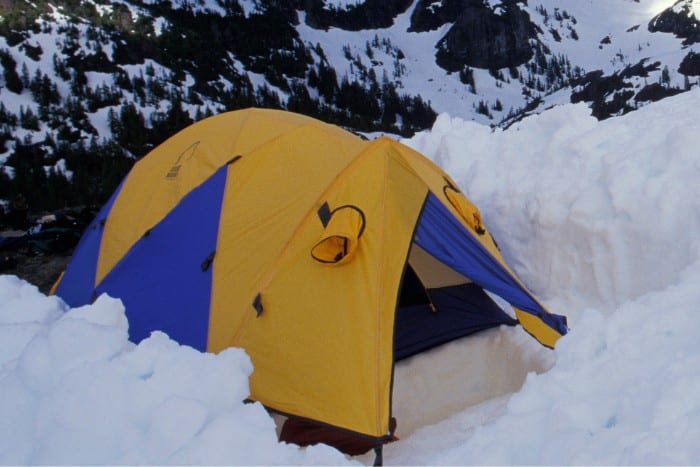
2. Insulated Sleeping Bag
Inside your insulated tent, you’ll want a reliable cold-weather sleeping bag. Down sleeping bags are a great option to pack as they’ll keep you warm in freezing temperatures.
Beware that they do lose their warm capabilities if they become wet.
We’d also recommend using a mummy-shaped winter sleeping bag that reduces the amount of space on either side of your body to keep warmth centered on you.
3. Sleeping Bag Liner
If you’re planning camping in freezing temperatures, your sleeping bag might need extra insulation, and a sleeping bag liner can do the trick.
They’ll easily bulk up a sleeping bag’s warmth rating to keep you toasty throughout the cold winter nights. They also reduce the need to wash your sleeping bag, as you can wash out the liner instead.
4. Sleeping Pad
A sleeping pad is vital during winter camping! They provide cushioning and insulation for a peaceful night’s sleep.
The ground beneath your camp can suck out the heat you create while you sleep, so a more insulated sleeping pad will reduce this heat loss as much as possible.
We’d recommend using an inflatable sleeping pad that’s lightweight and thicker.
5. Hand Warmers
Winter camping gets seriously cold, and when that chill gets to your bones, even clothes can struggle to keep you warm. That’s when hand warmers will be a lifesaver.
Slip them under your gloves, in your sleeping bag, or into your sock. They are compact and light, so they can fit into any winter backpack.
6. Stove
Of course, if you’re winter camping, you will need a stove. Before you set off, check what temperature you’ll be camping at. This is crucial as certain gas canister stoves will struggle to work in colder climates.
In this case, it’ll be essential to pack a stove that will continue to work regardless of fluctuations in temperature. We also recommend testing your stove before leaving just to ensure it works correctly!
7. Fuel
If you’re packing a stove, then you can’t forget fuel. Make sure the fuel you pack suits the conditions you’ll face.
Butane canisters will struggle to work below freezing, while a gas mix such as propane and butane will work better.
However, the canister will be heavier with gas mixes like this. Make sure you consider weight considerations if you’re going to be hiking with your fuel!
8. Water
A camping essential, regardless of the season, is water. The difference is in winter. You may not notice you are dehydrated because it’s colder.
Make sure you pack enough water for your trip. Water purifying tablets will be essential if you are planning to source water during your winter campout.
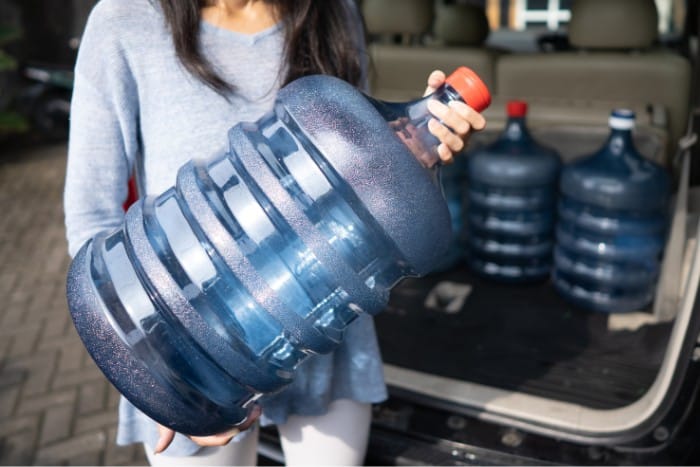
9. Airtight Containers
During the winter, food sources can be scarce for wildlife in the outback. This means you’ll want to pack your food and snacks in airtight containers to avoid any surprises visitors in your tent.
Airtight containers can also help to reduce litter and waste, making your camping trip more eco-friendly. Remember the leave-no-trace rule!
10. Thermal Base Layer
Make sure you keep your body warm during your winter camping trip by wearing thermal base layers.
Thermal base layers act as a second skin and keep your body dry by pushing sweat or moisture away from your body to stop you from getting cold.
Thermal base layers should be made from breathable materials such as merino wool, polyester, or nylon. You should wear these layers on your top and a pants version on your bottom.
11. Waterproof Coat
A sturdy waterproof coat can turn into your best friend while winter camping. Make sure you pack an insulated coat that will keep you warm and waterproof.
Especially if you’re camping in the snow, you’ll want to keep it as dry as possible. If you get wet and cold, you may risk hypothermia.
12. Thick Socks
A winter camping staple is thick socks. Like your thermal base layer, it’s best to pack breathable socks.
Your feet can struggle to ventilate moisture in winter boots, but thick thermal socks will allow your feet to remain dry.
Frostbite is most common on your hands and feet because the blood needs to circulate further, so circulation decreases once these parts of your body are cold. So keep your feet warm!
13. Gloves
The same goes for gloves. Make sure you pack gloves that keep your hands toasty throughout your camping trip. If you’re camping in the snow, it’s best to get a pair that is also waterproof.
Drying off clothing in the cold can be a long process, so waterproof gloves can help to avoid this scenario altogether.
14. Hat
No winter camping trip would be complete without a thick wooly hat. Any part of your body exposed to this season’s elements will make the rest of you cold.
Make sure you keep your head and ears covered. This will help the rest of your body to keep warm as well.
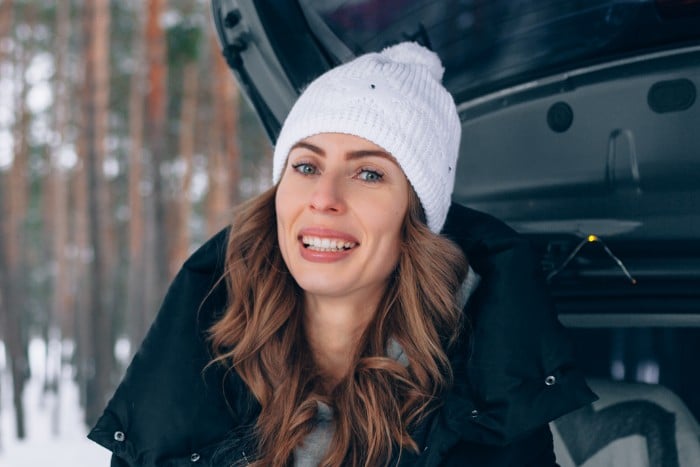
15. Dry Pajamas
If you’re packing light for your winter camping adventure, you may want to reduce your pack weight by forgoing your pajamas. We advise against this.
Sleeping in the clothes you’ve spent all day in can make it difficult to keep warm at night, especially if they’ve collected moisture.
Make sure you pack a clean, dry pair of pajamas to stay as warm as possible through the cold nights.
16. Head Torch
In many parts of the USA, winter will bring shorter daylight hours. You probably don’t want to sleep as soon as the sun goes down at 5 pm, so pack a torch.
A wind-up torch or solar-powered lights are also a good alternative to battery-powered torches. As well as this, a head torch is particularly helpful because you can continue using both hands.
17. Avalanche Beacon
Packaging an avalanche beacon may be mandatory if you are backcountry camping in the winter, where snowfall is heavy.
The beacon is worn somewhere on the body and emits radio signals to alert someone of your position in case you are buried in an avalanche.
18. Thermos
A thermos is an insulated flask that will keep your water or drinks hot for longer. Especially when you’re camping in freezing temperatures, a thermos full of hot coffee can be a welcomed treat.
A thermos will also keep your water from freezing, so you can remember to stay hydrated!
19. Food
If you’re taking a stove and fuel, then, of course, you will need food. You’ll likely be cooking outside of your tent, and to keep warm, you want meals to be fast and simple.
Ideas for quick meals can include noodles or oatmeal. You may even consider taking pre-cooked meals with you and reheating them when you need them.
I always take a chili con carne and stew on winter camping trips.
20. High Energy Snacks
Alongside your main meals, it’s also essential that you pack lots of high-energy snacks. High-energy snacks will be burnt by your body quickly throughout the day to generate energy and heat.
My favorite snacks include trail mix, nutritional bars, and bananas.
21. Winter Boots
Wear reliable, sturdy winter boots to keep your feet dry and warm. Take a pair that are waterproof and have a strong toe cap.
It can be handy to have a pair with good traction, especially if you’re camping in icy conditions. You don’t want to be slipping over!
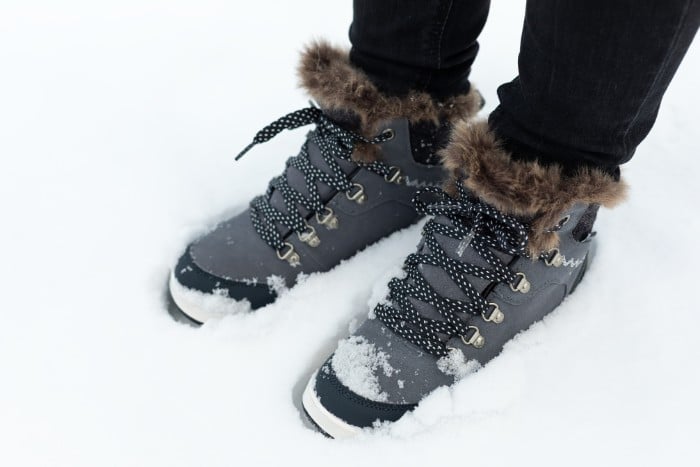
22. Gaiters
Gaiters are protective, lightweight gear that covers the gap between your boots and trousers. Your boots may come with built-in gaiters, but they can be a winter savior if they don’t.
A waterproof pair is crucial during the winter as they’ll keep snow or rainfall from seeping into your ankles.
23. Backpack
Hopefully, this is not a surprise, but you’ll need a backpack to pack your winter essentials! We’d recommend using a waterproof backpack.
If your belongings get wet in the winter, they’ll take longer to dry. So avoid this altogether and choose a backpack wisely!
24. First Aid Kit
If you’re planning to hike during your camping trip, you may want to reduce the weight of your pack as much as possible. However, you cannot replace your first aid kit with a wooly pair of socks.
In an emergency, a first aid kit could save your life. Make sure it’s fully stocked before you pack it and that you know how to use the items inside.
25. Shovel
Don’t forget a shovel! A shovel can have multiple uses during winter camping; you can dig toilet holes or pat down the snow before you pitch up your tent, and it can even be used to build a winter shelter.
Take a small, compact titanium shovel if you want to keep your backpack light.
26. Crampons
Crampons are a must if you plan to camp in icy or snowy conditions. Crampons will help you to avoid nasty missteps and allow you to move with sure-footedness.
Believe me; they will make unloading at a slippery parking lot much easier!
27. Ice Axe
For those planning to mountaineer during their winter camping trip, an ice axe is essential for safety. It can help you maintain balance or stop sliding down a slope.
Ice axes are also handy when traveling over glaciers or making an alpine ascent.
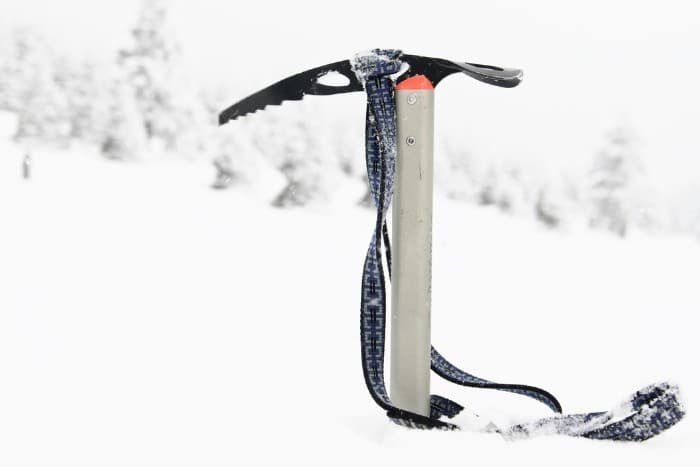
28. Knifes
Taking a knife during winter camping can have multiple handy uses, like shovels. If you plan to venture into the wilderness, a knife can help to prepare firewood, hunt, or build a shelter.
A knife can also be useful for food preparation! A swiss army knife can be a good alternative to a hunting knife.
A swiss army knife can come with scissors, a bottle opener, a couple of different blades, and maybe even a nail file!
29. Binoculars
Binoculars are not only for bird watchers! Binoculars can also be seriously handy if you’re planning to navigate during your trip.
Navigation can depend on identifying landmarks; binoculars can make this much easier. Especially if navigating in the snow and everything appears white!
30. Map and Compass
Even if you don’t plan to hike or ski during your camping trip, a map and compass can be extremely useful! If you’re camping in the snow, it can be easy to get lost when everything looks the same.
Before you set off, ensure you understand how to navigate correctly and account for declination. Also, make sure a waterproof case covers your map!
31. Whistle
For safety purposes, a whistle is essential for winter camping. An emergency whistle will alert someone to your position in challenging winter conditions.
It can also be used in response to someone that is also having an emergency. By taking a whistle, you are looking out for yourselves and your fellow campers.
32. Sunscreen
Even though it’s not summer, the reflection of sunlight off snow can lead to sunburn. Make sure you take a high SPF and UV sunscreen to protect your skin during your camping adventure.
It’s also handy to take sunscreen that’s water resistant!
33. Sunglasses
If you plan to camp in the snow, you’ll want to take a pair of sunglasses or glacier goggles. Without these, you could be at risk of snow blindness, where the sun’s reflection sunburns your eyes on the snow.
Sunglasses also help you see where you’re going, reducing your chance of falling or sliding down a slope.
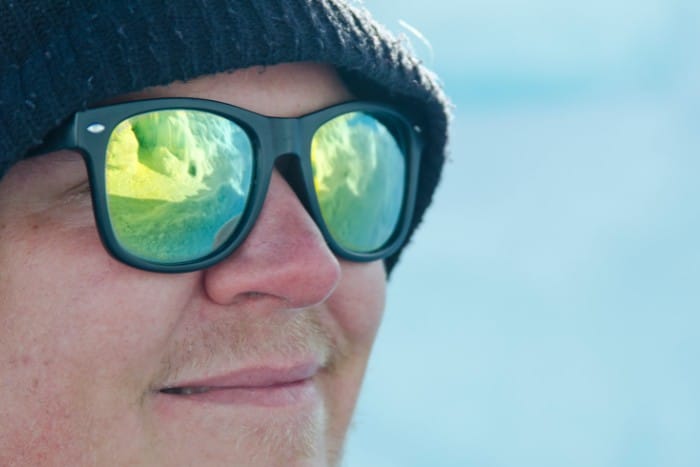
Final Thoughts
We hope our winter camping essentials list has given you a clear guide to all the gear you’ll need for a safe and enjoyable winter adventure.
Instead of spending your trip cold, our list takes the stress out of preparation, so you can make the most of camping in the winter.
